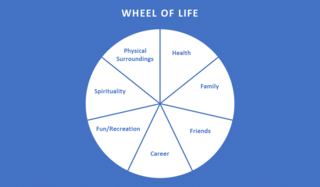Health
Regaining Career Security One Step at a Time
Moving forward in the face of uncertainty.
Posted March 20, 2020
The world has gone upside-down for many of us. What seemed secure is suddenly unstable. The monetary security we thought we were building is unclear. Our personal health and our sense of safety are being challenged. Our jobs, which seemed so stable, maybe even predictable, suddenly aren't.
The formerly wide-open job market with record-low unemployment is changing rapidly. This isn't the "disruption" Silicon Valley entrepreneurs often gleefully describe and welcome; this is a different kind of disruption altogether. Perhaps just a little too close to some of those dystopic books or movies we like to binge on.
What we seek now is stability. Predictability. A sense of knowing what the future holds. The very things we lack right now. But that doesn't mean we are helpless. We may not have control of a pandemic, but we do have control of ourselves: how we choose to think, how we choose to act, and how we choose to plan for our futures.
And a break in time like this, when many of us are in our homes unable to go through our normal patterns, can be a moment for introspection. We can take a moment to rethink our lives, our plans, and our priorities. We can even take a moment to breathe. Literally. Take a breath. Slowly. Do that a lot over the next few weeks and even years.
For the next few posts, I'm going to focus on regaining your sense of career stability. And, hopefully, along with that, your sense of personal stability. We're going to look at steps you can take. I know some of you are probably thinking that this is too hard right now: You're feeling panicked, and your brain seems incapable of focusing. You may have just lost your job. Or you heard on the news that recession is likely and that further job losses are coming.
So let's take it down to basics. Jon Kabat-Zinn has a wonderful quote that I'm paraphrasing here: "If you're breathing, there is more right with you than wrong." So we will start with that philosophy. No matter what is happening to you, if you are breathing, there is more right in your world than wrong. You may be focused, understandably, on all that is wrong at the moment. But there is potential. You have potential. And that potential is what we will build on.
The first step to solving a problem is to calm down.
If your mind is racing, and you're filled with panic, you aren't helping yourself or anyone else. When panic takes over, you lose your ability to think rationally and clearly. You become reactive and more likely to take impulsive actions that won't serve you well in the short or long term.
If you're feeling panicked right now, it's OK. Feel it; don't fight it. Fighting your panic only makes it worse. Instead, sit for a moment (or pace if you must) and breathe—deeply and slowly. Count to four on your in-breath and count to four on your out-breath. When you are stressed or panicked, you tend to breathe quickly and shallowly. Your mind is wildly careening from one negative thought to another. Calming breaths are one of the best ways to refocus your mind.
One technique is alternate nostril breathing. I know that sounds a little odd; here's a link to a video from Yoga with Adriene that explains it. (Two tips: first, wash your hands before doing this activity, because you will have to touch your face. And second, you can do this just sitting on your sofa. You don't have to sit in a yoga position.)
Want a different set of breathing ideas? Here's a great short TedTalk called "Change Your Breath, Change Your Life." (Is all this slow breathing making your panic worse? Try jumping jacks instead. Or running in place.)
Now that you are calmer, let's focus on life balance. Balance may seem like a ridiculous concept at the moment: Your life is probably anything but balanced. Blown up or chaotic might be the words you would choose. That's true. No one is denying whatever your personal situation is. That's why we're going to take a few minutes to look at how your life stands right now. And how you would prefer it to be. That's the start of setting goals for your future—even when parts of that are unknown.
Let's create a Life Wheel. This is a common technique for examining your overall life. We're going to check in on the key elements in your life and see what needs attention. You can draw the wheel below on a piece of paper or create it on your computer. Make it as simple or as creative as you would like. If you have time, feel free to use colored pens or markers or anything you want to make it fun. If you prefer a plain ballpoint pen, that's fine too. It's your life; do as you wish.

As you can see, the wheel divides your life into eight key sectors: finances, health, career, friends, family, physical surroundings, fun/recreation, and spirituality.
Take a few minutes to think about each of these sectors in your life. If one sector doesn't fit your life, feel free to change it. For instance, you might want to replace "physical surroundings" with "personal development." Or if you're a student you might want to put "Education" in place of one of sectors. You might not have any family, so you could select another part of your life that is important to you. You might choose "Travel" or "Pets" or anything that works for you. This is meant to be somewhat flexible, but it's always a good idea to keep finances in the mix.
Write down some key elements of each of those sectors. For instance, under friends, you might want to list your closest friends. Under fun/recreation, you might want to list your hobbies or favorite TV shows. Under health, you might want to list any current health concerns or activities related to wellness, such as your diet or exercise plans.
Once you've thought about each sector, rate the area for your current level of satisfaction. Give it a grade from 0 percent (completely unsatisfied) to 100 percent (completely satisfied). Write the grade next to the word, and if you want, color in the block to demonstrate what percentage of satisfaction you gave it. If you graded yourself a 50 on a sector, for instance, you would color in 50 percent of the block.
Now take a look at the sectors of your life where you are most satisfied. What makes you satisfied in that area? What is working well for you? It's always good to note what is right. If you're not 100 percent satisfied, can you think of what would make that area even better? Jot down your ideas.
After that, take a look at the areas of your life where you are least satisfied. Here are some questions to ask yourself:
- Is this a temporary dissatisfaction brought on by current circumstances? Will it go away or be fixed soon?
- Is it a longer-term dissatisfaction? Have you felt this way for a while?
- Is this an area you need to focus on now, or can you give it a lower priority compared to other areas?
- What sectors are most difficult for you? Where did you have the most challenges coming up with positive examples?
- What would improve this area of your life?
- What can you do now to start improving it?
- What is a goal you could set, just for today, that would help improve this area?
So what have you learned from this exercise? Were you able to find some areas of your life where things are going well? Or do you need a reset button and take charge of developing a new life or a new plan?
If you have been laid off, what goals can you set right now? Can you apply for unemployment? Is there a short-term job you could get to help immediately? In many communities, grocery stores and distribution centers are hiring at the moment to help deal with the pressures they are facing. You can check out sites like Freelancer.com to find work you can do from home.
If your finances are in disarray, what could you do today to start rebuilding? Are there some monthly subscriptions or expenses you could do without? Can you economize on food/restaurant purchases? Do you need to think about a second job or alternate source of income?
What two to three goals can you identify that would start to improve your situation right now? Remember, you can't control everything. And you can't fix everything at once. So start by focusing on what is under control—what is working. Remind yourself about that first. Then select which item you want to focus on next, and what step you could take today to start improving it.
So that's it for today. Just getting a visual handle on where you are in your life at the moment can help you identify the areas you want to change and improve. Use this time to focus on what you want for your future. The current crisis will not last forever. Use this time to focus on what you want your next life—your new life—to be.
In upcoming posts, I will focus on transitioning to a new career, creating "job insurance," and other topics related to current events.
©2020 Katharine S Brooks. All rights reserved.




